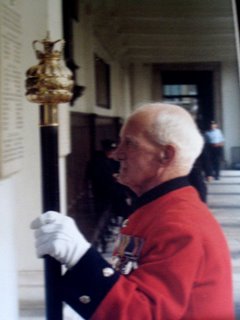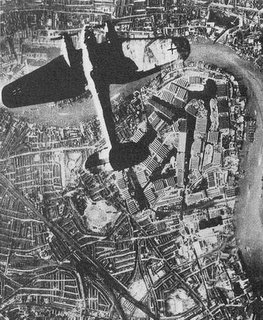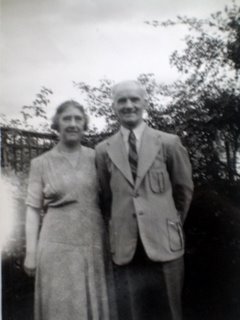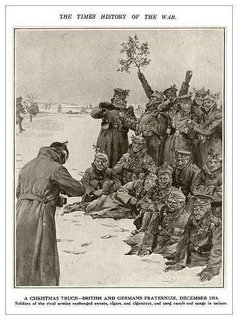
Though Walter and I exchanged Christmas cards and I sent him little gifts from 1977-1980, he wrote very little about the Christmases of his lifetime. The previous post concerning Doug's death on Christmas Eve 1974 was the lengthiest Christmas tale in his letters to me. I suspect Sheffield Children's Homes holidays were not that remarkable, since he only mentioned it once:
The Christmas of 1902 passed by without any regret, as we were unaware of the spirit of the occasion. The time had come to think more of my school lessons, as I realized I would be leaving school next year. Interesting observation, "we were unaware of the spirit of the occasion." I often wonder if he heard from his mother and brother Fred during this time. Did they visit Sheffield at Christmas, or stay put in Folkstone? Did Walter, Bert, and Harry gather with John's family at all (since his parents and siblings lived in the Sheffield area)? If not, why not? Did anyone communicate with little Annie (per Walter, she was in a girls home in Whitley Bay) during Christmas?
Walter's next mention of the holiday is Christmas 1910, as a soldier in the 2nd Lincolnshires:
The regiment returned to Aldershot [after attending funeral of King Edward VII] and we settled down to our normal duties again. Field training, which eventually led up to autumn manoevres, took place which concluded in November. Christmas Leave took place, and on the return from leave, the regiment were to prepare to leave Aldershot to go to Portsmouth.From Portsmouth, the regiment headed to Aden, where it's posted until 1912. After returning to England, 2nd Lincs settled back in Portsmouth until August 13, 1914 (and we know what happened then). Here's all Walter wrote about the famous Christmas Truce of 1914:
And at Christmas 1914, we were in a village called Kemmel, where we were found accommodation in the farmhouses and outhouses of the villagers. It was on this day that Queen Mary’s gift boxes were issued to us containing pipe and tobacco. I didn’t smoke, so I kept mine in my kit. Walter survived Begium, returning to England with a foot injury May 1915. By Christmas of that year he had been selected for the Machine Gun Corps. He wrote two little bits about that Christmas in his letters:
In October 1915, I was chosen with other men to become a party to go home to be trained as Machine Gunners in the Machine Gun Corps, which was being formed in Grantham, Lincolnshire. I arrived there, and we were taken to Belton Camp, a large estate belonging to Lord Brownlow. It was a quagmire, and duck boards had to be laid to walk on. This was another Christmas!
Then this:
After I returned to Weelsby Camp [after Clopton War Hospital and marrying May] I was chosen to go to Grantham to join the new formation of the Machine Gun Corps in Belton Camp Lord Brownlow’s estate. And I might say, it was in a state too. Mud, mud, everywhere! This was November 1915. Men from all regiments converged on this camp, but soon as always everything works out like a jigsaw. Christmas was spent in the Camp, and we had to improvise the best we can. We were living in huts, heated with coke stoves. So I reckon he and May celebrated their first married Christmas apart - Walter at Grantham, May in London.
There are no more mentions of Christmas until 1919, when Walter was stationed at Jamrud Fort, Khyber Pass:
Our commanding officer used to have all the mules on parade, and we had to ride them bareback. What a penance the was! We could hardly walk when we returned to camp, and we were sore for days. One of his little whims I suppose. We spent 1919 Christmas in this God forsaken place under canvas but we got hardened to this way of soldiering. Fast-forward 52 years - quite a gap in the Christmas memories - to the year 1971, his first since May's death. It was an unsettling time for Walter, that time between selling the house in Mortlake and his decision to go to Royal Hospital Chelsea, and I think that's reflected in his rememberance of the time:
When I had got settled in Bedford [with Doug's family], I was like a lost sheep. No outlet, only to take Mary’s poodle for several walks each day. I got to like Sambo, and he got to know me too. But what a life! Ron had by now bought his bungalow in Kenilworth and he had to start from scratch. It is quite an experience for anyone to settle down in civil life when leaving the services, coming out in the cold world. When Ron did eventually get established, I told Doug I would like a change, and to spend a little time with Ron. This I did until the Christmas of 1971. I then returned to Bedford but in September 1972, I returned to Ron in Kenilworth. Alma had her grandma staying with her, which didn’t make matters any better for them. I had to devise some form of escape from this subservience which I was under. I laid in my bed at night thinking what I could do for the best.It was during his nighttime thinking times that he decided once and for all to go to Chelsea. I'm glad he went - I'd've never met him otherwise - but it makes me sad to think of his struggling to figure out where he fit in after all he'd been through in his life.
He was proud of his duties as guide and verger at the Royal Hospital's famous chapel. He loved talking to people and was an outstanding guide, I'm sure. And as I've mentioned before, I went to the Harvest Festival at the Royal Chapel one year and got to see a very solemn Walter carry the scepter during the procession (pictured above).
I attended Divine Service each Sunday, as I had to carry out a very dignified duty in carrying the Scepter in front of the Chaplain during the singing of the first hymn. Royalty have attended on Founders’ Day which is held in honour of our Founder Charles II every first Thursday after his birthday, called Oakapple Day. He passed away at an early age of 55 years in 1685. I have had the honour of meeting the Queen Mother, Duchess of Kent, Prince Charles, and although I was not on duty when our Queen was the Governing Body, I had the pleasure of seeing her while on parade on Founders 1975. I was on duty on every third day. There were many important religious ceremonies carried out. The Harvest Festival, The Remembrance Day, Christmas Day, and several memorial services were performed. We were responsible for the security of the Chapel on the completion of the day’s duty, and the keys were taken to the Guard room for safe custody. And so ends the season of Christmas according to Walter's letters to me. He always got a kick out of my cards and gifts (usually handmade ornaments of some kind) and seemed to enjoy the holiday. But he never revealed much about the Ghosts of Christmas Past in his letters to me.
 In terms of relentless bombing, London was probably the worst place to be during the Second World War. My English "dad," Aubrey - who lived smack in Victoria at the time, once told me that he joined the Royal Navy because it was a lot safer than staying put in London. Children were sent to the countryside or as far afield as the United States and Canada. Beyond that, Londoners just dug in and carried on.
In terms of relentless bombing, London was probably the worst place to be during the Second World War. My English "dad," Aubrey - who lived smack in Victoria at the time, once told me that he joined the Royal Navy because it was a lot safer than staying put in London. Children were sent to the countryside or as far afield as the United States and Canada. Beyond that, Londoners just dug in and carried on.



